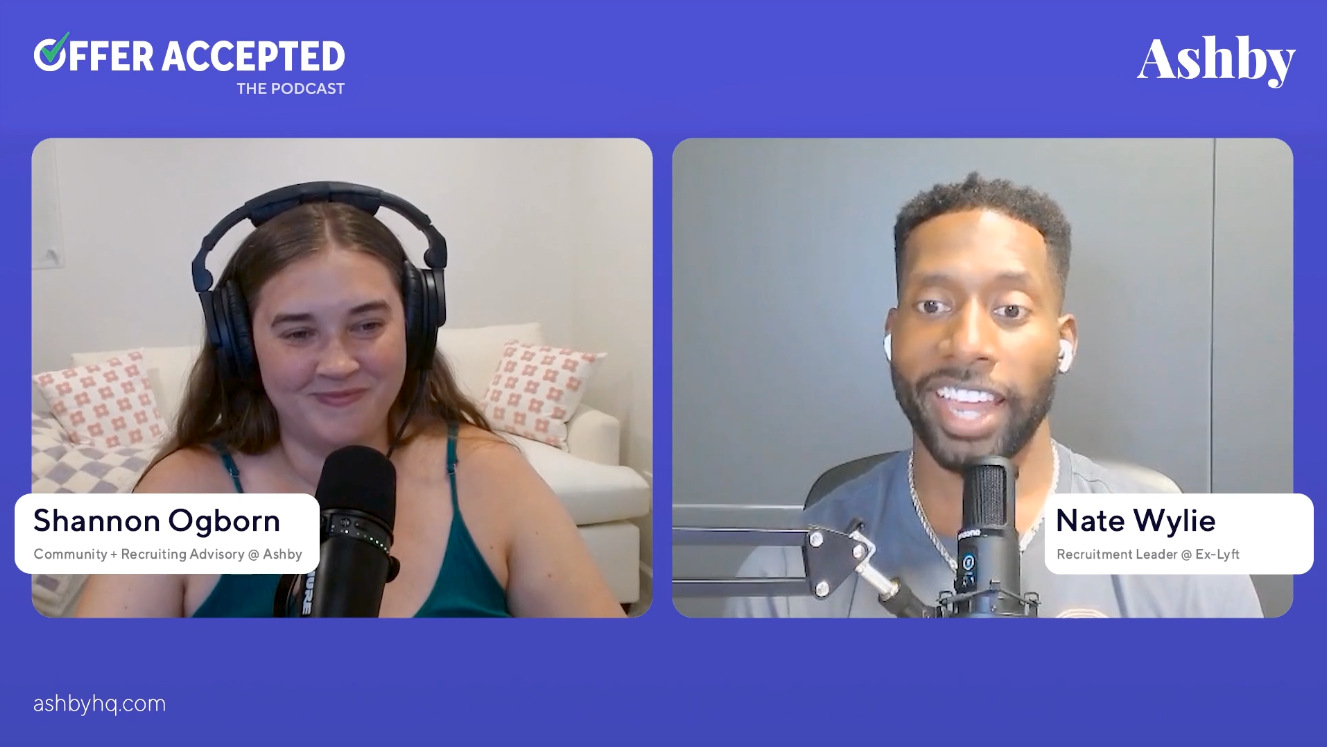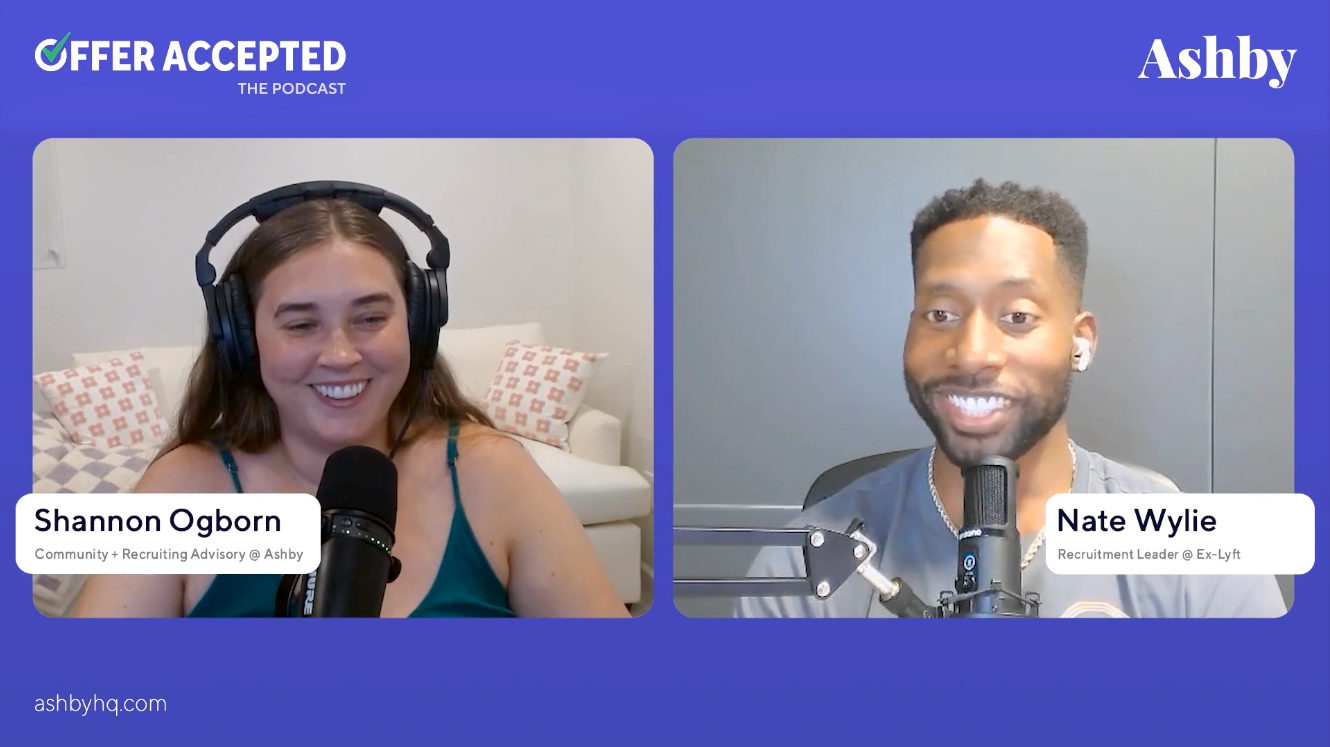Screen In vs Screen Out Recruiting
About this Episode
In this episode, Nate Wylie, a Talent Acquisition consultant with experience in start-ups and Big Tech, delves into the philosophy of “screening in” candidates rather than “screening out.” Drawing from his time leading data science and machine learning hiring at Lyft, Nate highlights how this approach, combined with fostering trust with hiring managers and tailoring recruitment processes, creates more effective hiring strategies.
We explore how this mindset helps refine role requirements through exploratory conversations, align expectations with market realities, and streamline hiring while ensuring candidates are evaluated for their potential and contributions, not just their qualifications.
Topics
This Episode's Guest
Nate Wylie
Talent Leader + Founder @ Previously: Lyft, Tangelo + Infinate Talent
Nate Wylie is a Talent Acquisition consultant with extensive experience in start-ups and Big Tech, specializing in scaling teams through strategic growth and efficient processes. Previously, he led recruitment for data science and machine learning teams at Lyft and served as Head of Talent at a Tangelo, where he redefined recruiting practices and implemented cost-saving innovations.
Takeaway 1
Align Hiring Expectations with Market Reality ⚖️
Hiring success begins with resetting expectations. Nate emphasized that rigid demands for "A+ candidates" can backfire, delaying essential hires and straining teams. Instead, focus on what truly matters for the role, and help stakeholders understand the trade-offs between idealism and practicality.
Why It Matters:
Unrealistic hiring standards can create unnecessary bottlenecks in your recruitment process, leaving critical roles unfilled and frustrating hiring teams. By fostering a shared understanding of market realities, organizations can align more effectively and make impactful hiring decisions.
Quick Tips:
- Identify key priorities: Discuss ranking role requirements with stakeholders to clarify must-haves versus nice-to-haves.
- Share realistic benchmarks: Use data on salaries and availability to adjust hiring manager expectations. Agree on how quickly candidates will be presented and reviewed.
- Encourage flexibility: Frame trade-offs as opportunities to hire talent with strong growth potential.
Takeaway 2
Screen for Potential, Not Perfection 🔍
Nate’s philosophy of “screening in” focuses on identifying what candidates can contribute, rather than rejecting them for what they lack. This mindset fosters a culture of growth and innovation while addressing immediate organizational needs.
Why It Matters:
Traditional recruitment methods can unintentionally exclude high-potential candidates who may not fit conventional molds. Shifting to a screening-in approach ensures you identify a wider talent pool that is capable of immediate contributions and long-term success.
Quick Tips:
- Redefine the ideal: Reassess what gaps there are in the organization, and screen in candidates accordingly to those gaps versus merely looking for “ideal” credentials (e.g. background at certain companies, degrees from specific universities).
- Identify transferable expertise: Consider candidates with transferable skills, especially those from nontraditional backgrounds, who can bring unique perspectives to your business.
- Leverage exploratory interviews: Start by facilitating calls with potential candidates to uncover unique insights and refine expectations with hiring teams.
Takeaway 3
Tailor Your Recruitment Processes🌐
Every organization is unique, and Nate highlighted the importance of crafting a recruitment process that aligns with your culture, goals, and team dynamics. A tailored approach ensures better alignment and long-term success.
Why It Matters:
Generic hiring processes fail to account for the nuances of your organization’s needs, leading to misaligned hires and higher turnover. By reflecting your culture and values at every stage, you’ll attract candidates who are a better match and more likely to thrive.
Quick Tips:
- Adapt processes to market shifts and feedback: Regularly revisit recruitment workflows to reflect changes in market trends and candidate feedback.
- Leverage hiring manager insights: Involve key stakeholders to refine processes based on organizational gaps.
- Keep candidates informed regularly: Becky emphasized the need for consistent communication so that candidates aren’t left wondering about their status. This practice helps maintain a positive candidate experience.
What Hiring Excellence Means to Nate
For Nate, hiring excellence is about creating tailored processes that reflect an organization’s unique needs. He believes in balancing structured methodologies with flexibility to adapt as market conditions evolve. This ensures that recruitment efforts align with long-term business goals while addressing immediate challenges.

Nate's Recruiting Hot Take
Traditional interviewing processes are outdated and often ineffective. He suggests giving candidates the option to choose how they’re evaluated, ensuring they can showcase their strengths in the most meaningful way. This approach not only improves the candidate experience but also helps hiring teams identify the best talent more accurately.

Timestamps
(00:00) Introduction
(03:05) Common recruitment pain points in startups
(05:16) Aligning founders’ expectations with market realities
(08:11) Screening in vs. screening out
(10:30) What is screening in?
(14:46) The importance of forecasting in recruiting
(20:44) Managing founder expectations and candidate budgets
(25:12) The value of screening in candidates
(30:09) Defining hiring excellence
Other Episodes
Safeguarding Interviews from ChatGPT Misuse
In this episode of Offer Accepted, Aline Lerner and Michael Mroczka tackle the challenges posed by AI tools like ChatGPT in technical hiring. They discuss actionable strategies to evolve interview processes, prioritize fairness, and safeguard hiring integrity.
Reframing Thoughtful Rejections
In this episode of Offer Accepted, Selcan Sengul shares how her team at Taxfix redefined candidate communication with human-centered recruiting. From personalized rejection templates to DEI alignment, Selcan offers actionable strategies for creating a candidate experience that reflects company values and builds trust.

Join the Hiring Excellence movement
New episodes every month - subscribe here so you never miss out.
